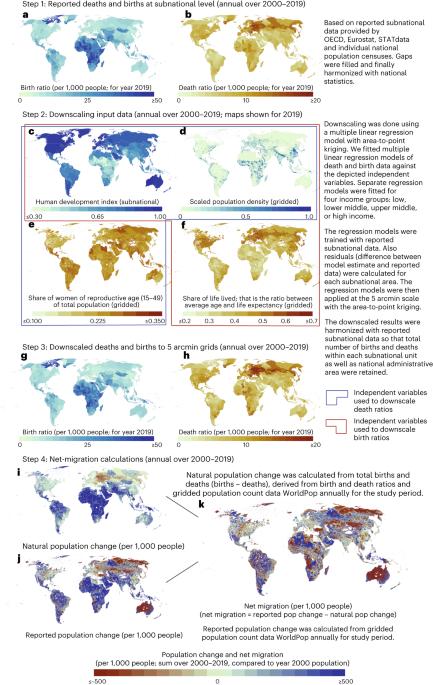World’s human migration patterns in 2000–2019 unveiled by high-resolution data
IF 21.4
1区 心理学
Q1 MULTIDISCIPLINARY SCIENCES
引用次数: 0
Abstract
Despite being a topical issue in public debate and on the political agenda for many countries, a global-scale, high-resolution quantification of migration and its major drivers for the recent decades remained missing. We created a global dataset of annual net migration between 2000 and 2019 (~10 km grid, covering the areas of 216 countries or sovereign states), based on reported and downscaled subnational birth (2,555 administrative units) and death (2,067 administrative units) rates. We show that, globally, around 50% of the world’s urban population lived in areas where migration accelerated urban population growth, while a third of the global population lived in provinces where rural areas experienced positive net migration. Finally, we show that, globally, socioeconomic factors are more strongly associated with migration patterns than climatic factors. While our method is dependent on census data, incurring notable uncertainties in regions where census data coverage or quality is low, we were able to capture migration patterns not only between but also within countries, as well as by socioeconomic and geophysical zonings. Our results highlight the importance of subnational analysis of migration—a necessity for policy design, international cooperation and shared responsibility for managing internal and international migration. Producing a high-resolution global net migration dataset for 2000–2019, Niva et al. analyse how migration affects urban and rural population growth and show that socioeconomic factors are more strongly associated with migration than climatic ones.

高分辨率数据揭示了2000-2019年全球人类迁徙模式。
尽管移民问题已成为公共辩论和许多国家政治议程上的热门话题,但对近几十年来全球范围内的移民及其主要驱动因素进行高分辨率量化仍然缺乏。我们创建了2000年至2019年年度净移民的全球数据集(约10公里网格,覆盖216个国家或主权州的地区),基于报告和缩小的次国家出生率(2,555个行政单位)和死亡率(2,067个行政单位)。我们表明,在全球范围内,大约50%的世界城市人口生活在移民加速城市人口增长的地区,而全球三分之一的人口生活在农村地区经历了正净移民的省份。最后,我们表明,在全球范围内,社会经济因素与移民模式的关系比气候因素更为密切。虽然我们的方法依赖于人口普查数据,在人口普查数据覆盖率或质量较低的地区会产生明显的不确定性,但我们不仅能够捕获国家之间,而且还可以捕获国家内部以及社会经济和地球物理区划的迁移模式。我们的研究结果强调了对移民进行次国家层面分析的重要性,这是政策设计、国际合作和共同承担管理国内和国际移民责任的必要条件。
本文章由计算机程序翻译,如有差异,请以英文原文为准。
求助全文
约1分钟内获得全文
求助全文
来源期刊

Nature Human Behaviour
Psychology-Social Psychology
CiteScore
36.80
自引率
1.00%
发文量
227
期刊介绍:
Nature Human Behaviour is a journal that focuses on publishing research of outstanding significance into any aspect of human behavior.The research can cover various areas such as psychological, biological, and social bases of human behavior.It also includes the study of origins, development, and disorders related to human behavior.The primary aim of the journal is to increase the visibility of research in the field and enhance its societal reach and impact.
 求助内容:
求助内容: 应助结果提醒方式:
应助结果提醒方式:


